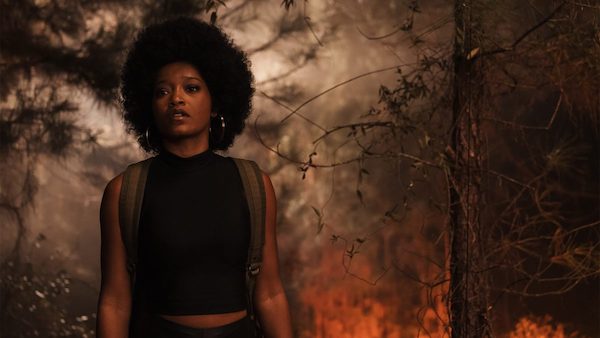Film Reviews: Sundance 2022, Dispatch #4 — Trauma and Terror
By Peg Aloi
When given a choice, I tend to choose films that are fairly harrowing to watch. The next three Sundance Fest films on my slate were often disturbing, but also powerful and inspiring on many levels.

A scene with Keke Palmer from Alice. Photo: courtesy of the Sundance Institute, Kyle Kaplan
Alice is an inventive historical/fantasy hybrid, inspired by actual cases of Black people being kept as slaves a full century after emancipation was declared in the United States. As the film opens, Alice (Keke Palmer) and a number of other slaves are suffering under degrading and harsh treatment on a Georgia plantation. Alice watches helpless as her husband, who she had to marry in secret, is beaten severely. One day she seizes the chance to escape by running through the woods. She comes to a highway full of cars and is shocked to realize it is a hundred years later than she’s been told. A trucker named Frank (Common), who was active with the Civil Rights movement in the ’60s, picks her up and helps her become acclimated to her new life. Her transformation from 19th-century slave to empowered 20th-century woman comes about so quickly and easily that realism falls by the wayside. Still, first-time feature director Krystin Ver Linden’s eclectic framework stands as a powerful allegory as well as a triumphant tale of survival. Palmer’s excellent performance gets at the character’s deep pain and anger, and Common shines as a man who has been disillusioned by years of injustice. The film’s unusual and layered timeline — buoyed along by a richly detailed production design — successfully evokes a strong sense of déjà vu and timelessness: Alice delivers a potent reminder that the struggle for racial equality is ongoing and seemingly endless.

Rebecca Hall in Resurrection. Photo: courtesy of the Sundance Institute, Wyatt Garfield
I’m always interested in actor Rebecca Hall’s work (and was blown away by her directing debut in 2021’s Passing). In writer-director Andrew Semans’s film Resurrection, Hall plays Margaret, a successful executive in complete control of her life. She’s having a low-stakes affair with a married co-worker (Michael Esper) and is, perhaps, a bit too protective of her teenage daughter Abbie (Grace Kaufman). When her former partner (Tim Roth in a subtle and terrifying performance) starts showing up in odd places, Margaret’s unresolved trauma from their decades-old relationship erupts, upending her stable existence. The uniformly compelling cast transcends what I found to be a rather poorly-conceived plot that really never makes much sense: the very real and human horror of being tortured by a psychopath is overshadowed by a bizarre plot point that tries for magic realism but is instead confusing and seems wildly out of character for Margaret. Despite the film’s taut pacing and suspenseful arc, Resurrection’s increasingly unfathomable narrative made it hard for me to appreciate Hall’s white-hot performance.

Singer Sinéad OʼConnor in Nothing Compares. Photo: courtesy of the Sundance Institute
In this debut feature documentary, Nothing Compares, Kathryn Ferguson traces the supernova rise of a young Sinéad O’Connor, long considered one of the most iconic and unique pop stars on the international music scene. The director draws on archival footage that spans four decades: O’Connor’s currently deepened, gravelly voice contrasts sharply with the softer, higher tones we hear in her earlier interviews. The film explores the performer’s abusive childhood, her reckoning with the misogynistic dominance of the Catholic church in Ireland, and her prodigious talent, which earned her platinum record sales and numerous awards in the early 2000s.
The film also examines O’Connor’s seemingly abrupt fall from grace: her performance on Saturday Night Live, in which she ripped up a photo of Pope John Paul II, ignited a firestorm of ridicule and hatred. Despite returning to touring and recording after a hiatus, the singer continued to struggle with depression, her condition no doubt fed by the ongoing harsh public judgment of her unapologetic activism and signature androgynous style. I was unexpectedly moved by Nothing Compares‘ intimate tone, its unflinching look at the career and legacy of an outspoken female performer, much maligned and misunderstood by a world that simply was not ready for her.
Peg Aloi is a former film critic for the Boston Phoenix and member of the Boston Society of Film Critics. She taught film studies in Boston for over a decade. She writes on film, TV, and culture for web publications like Vice, Polygon, Bustle, Mic, Orlando Weekly, Crooked Marquee, and Bloody Disgusting. Her blog “The Witching Hour” can be found at themediawitch.com.
Tagged: Alice, Andrew Semans, Kathryn Ferguson, Krystin Ver Linden, Peg Aloi, Rebecca Hall, Resurrection, Sinead O’Connor
